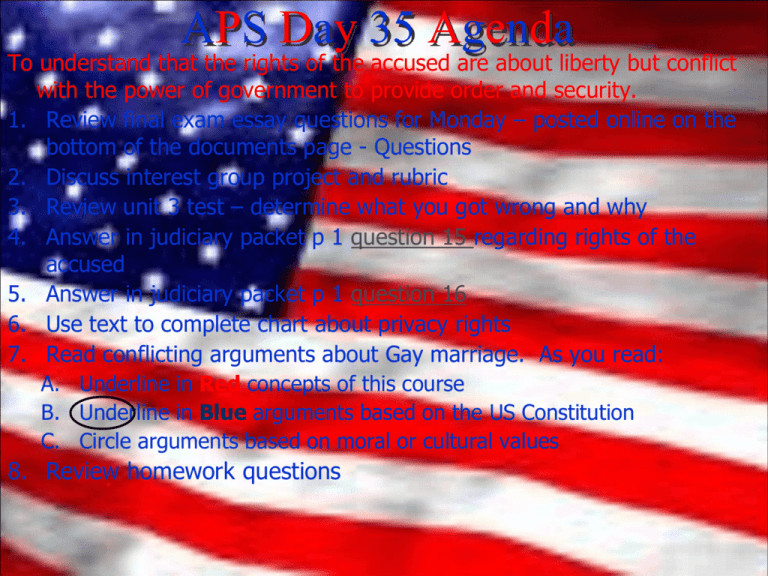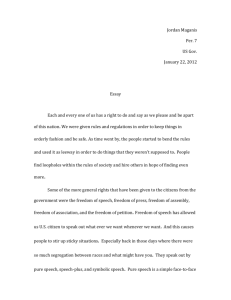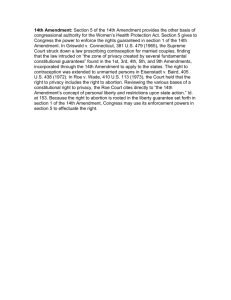APS honors 35 '09 - rights fo the accused gay rights
advertisement

APS Day 35 Agenda To understand that the rights of the accused are about liberty but conflict with the power of government to provide order and security. 1. Review final exam essay questions for Monday – posted online on the bottom of the documents page - Questions 2. Discuss interest group project and rubric 3. Review unit 3 test – determine what you got wrong and why 4. Answer in judiciary packet p 1 question 15 regarding rights of the accused 5. Answer in judiciary packet p 1 question 16 6. Use text to complete chart about privacy rights 7. Read conflicting arguments about Gay marriage. As you read: A. Underline in Red concepts of this course B. Underline in Blue arguments based on the US Constitution C. Circle arguments based on moral or cultural values 8. Review homework questions American Political System – Final Essay Questions 1. In practice, which branch of the federal govt. has the most power? Use current and /or historical examples to support your position. 2. Is our government today still based upon the following principals established by the Founding Fathers? Popular sovereignty Federalism Separation of Powers Limited Government Checks and Balances 3. Explain the role of TWO of the following groups and evaluate whether they have a positive or negative impact on the American political system. Political Parties Interest groups and lobbyists The Media How does federalism play a role in the debates regarding civil liberties and rights? What judicial doctrine uses the US Constitution to restrict state government actions? • At first the states could do whatever their own constitutions permitted. • This interpretation of the 10th Amendment reserved powers clause and state’s rights view of federalism allowed for widely different civil liberties and rights in different states. • This continues to be the case to some extent regarding controversial issues like gay marriage, right to die, capital punishment • However, the incorporation doctrine interpreted from the 14th Amendment’s due process clause allows the courts to use the US Constitution to limit state government action. The Bill of Rights’ clauses of the 1st, 4th, 5th, 6th and 8th Amendments that are “fundamental principles of liberty and justice which lie at the base of all our civil and political institutions” are “obligatory on the States.” (See Gideon ) Rights of the accused 15a – Mapp v Ohio (1961) 6-3 police in states have to follow the 4th Amendment – must have a search warrant or the evidence is excluded from trial 15 b –Miranda v Arizona (1966) 5-4– police taking a person into custody must make the prisoner aware of his/her rights protecting against self-incrimination and guaranteeing the person’s right to a lawyer. 15 c – US v Leon (1989) 6-3 evidence does not need to be excluded if the police use a warrant “in good faith” even if the warrant itself is technically bad. 15 d – New Jersey v TLO (1985) 6-3 Students in school may be searched by school officials without warrants so long as there is a reasonable suspicion that a violation has occurred Expression and personal autonomy 16 a - Abington v Schempp (1963) – 8-1 states and public schools may not require a school-wide, school-sponsored prayer because of the separation of church and state implied in the establishment clause of the 1st amendment 16 b – Tinker V Des Moines (1969) 7-2 school may not punish a student for expressing their views, especially political views, so long as the expression is not disruptive to the regular order of the educational environment 16 c Roe v Wade (1973)– 7-2 the court ruled that abortion cannot be outlawed in the first trimester, may be regulated in the 2nd and may be even further regulated in the 3rd unless the life or health of the mother is at risk. 16 d- Texas v Johnson (1989) 6-2 flag-burning is constitutionally protected speech Equality Cases 17 a – Brown (1954) 9-0 public schools cannot be segregated because “separate educational facilities are are inherently unequal.” 17 b – Bakke (1978) 5-4 school may not use racial or other quotas but may take minority status into account for admissions 17 c – Wesberry v Sanders (1964) 6-3 – federal congressional districts must be essentially the same size within a state – one person, one vote 17 d – Nashville Gas v Satty (1977) women cannot be unequally compensated or mistreated in the workplace – women can be placed on mandatory unpaid leave for pregnancy, but may not lose their positions or seniority when returning to work Complete a chart regarding the Griswold, Roe, Bowers and Lawrence cases Case and date Constitutional issue Opinion of the Court Griswold v Connecticut (1965) - 7-2 Privacy in personal activity regarding contraception There is no right to 4th A protects individual’s private conduct, implying a privacy anywhere in right to privacy. Concurring the Constitution – 9th and 14th A too. Roe v Wade (1973) - 7-2 Privacy in personal activity regarding termination of pregnancy Privacy is to be found in 14th A due process clause and in the 9th A Bowers v Hardwick (1986) 5-4 Privacy in personal activity regarding homosexual activity There is no constitutional or historical support for protecting homosexual actions Lawrence v Privacy in personal Texas (2003) 6-3 activity regarding homosexual activity Privacy, due process and equal protection Dissenting opinion Abortion is definitely not protected anywhere in the Constitution Privacy and liberty built into the 4th and 14th A There is no constitutional protection for different kinds of sex





